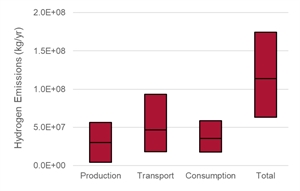Government report highlights fears about warming potential of fugitive hydrogen emissions
Fri 08 April 2022
View all news

A new report commissioned by the Government aims to identify and quantify the potential climate risks from fugitive emissions resulting from a future hydrogen economy. The new report says that leakage of hydrogen into the atmosphere has a greater indirect warming effect on the climate than previously thought and will need to be closely monitored and minimised as much as possible.
The new report builds on complementary research, also published by the Government, which has identified that hydrogen has double the global warming potential (GWP) previously assumed.
The first report, by the University of Cambridge for BEIS, working with comprehensive atmospheric modelling, said that hydrogen is itself an indirect greenhouse gas with an estimated GWP 11 times that of carbon dioxide (over a 100-year time horizon).
With hydrogen likely to play a significant role in the decarbonisation of the UK’s future energy system, understanding the extent of fugitive emissions across different low carbon hydrogen supply chains is important for policy development and meeting net zero.
The second report by Frazer Nash Consultancy (also for BEIS) investigates and quantifies the potential for hydrogen emissions across different sectors of the economy, showing that there are some key areas in production, distribution and end-use where there is potential for significant leakages of hydrogen to the atmosphere. In some of these areas there are clear mitigation options but in other areas, the options are less clear due to uncertainty in either data or future technology development.
The report says that further research is needed to identify the main areas potential hydrogen leakage as well as effective measures to control them.
Commenting on the report Zemo Partnership's Head of Sustainability, Gloria Esposito said: "Considering hydrogen's low molecular size, eliminating leakages will be a difficult challenge, particularly when hydrogen is stored and transported in liquid form.
"Without appropriate mitigation, fugitive hydrogen emissions (like many other gases) could adversely affect the climate benefits of using hydrogen as a low carbon energy vector. Close control of hydrogen leakages should be undertaken during hydrogen production, transportation, refuelling and different end use applications. Furthermore, fugitive emissions should be accounted for in methodologies used to determine the carbon intensity of low carbon hydrogen supply chains.
"In our view, official grant funding to encourage hydrogen applications should include a commitment by the recipient to monitor and capture or mitigate fugitive emissions."
Related Links
< Back to news list